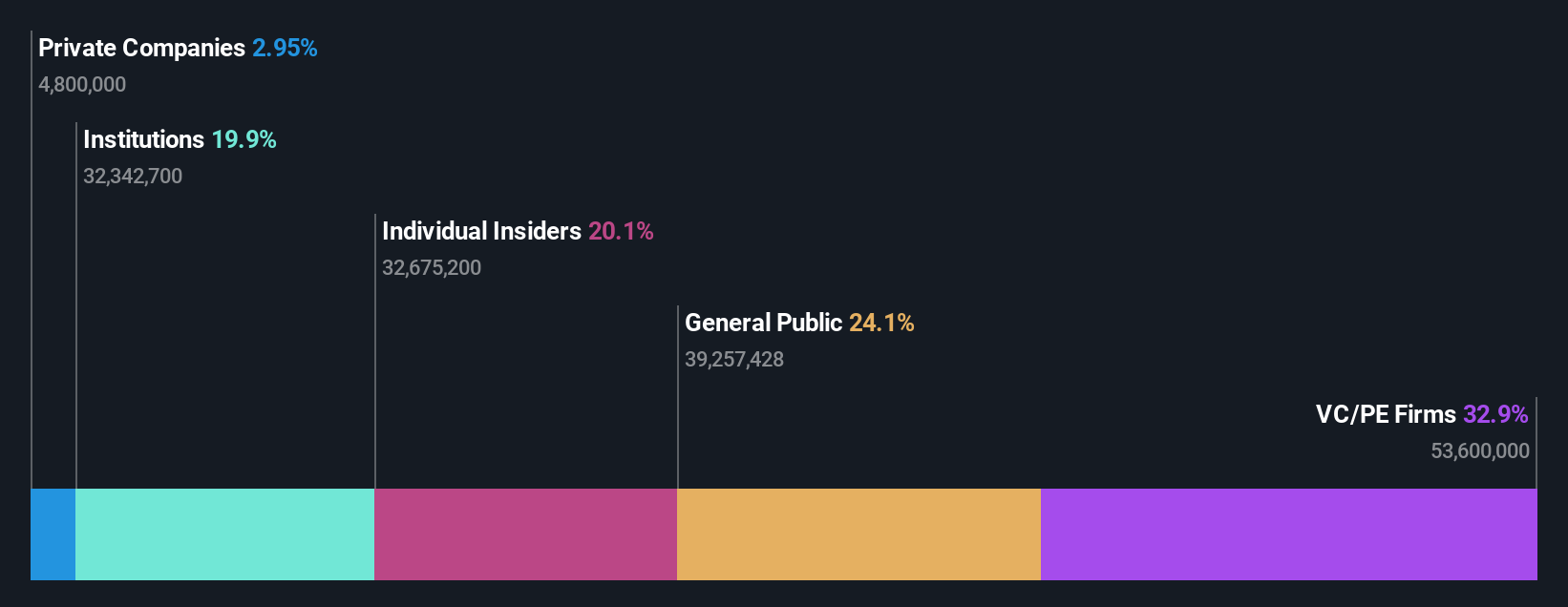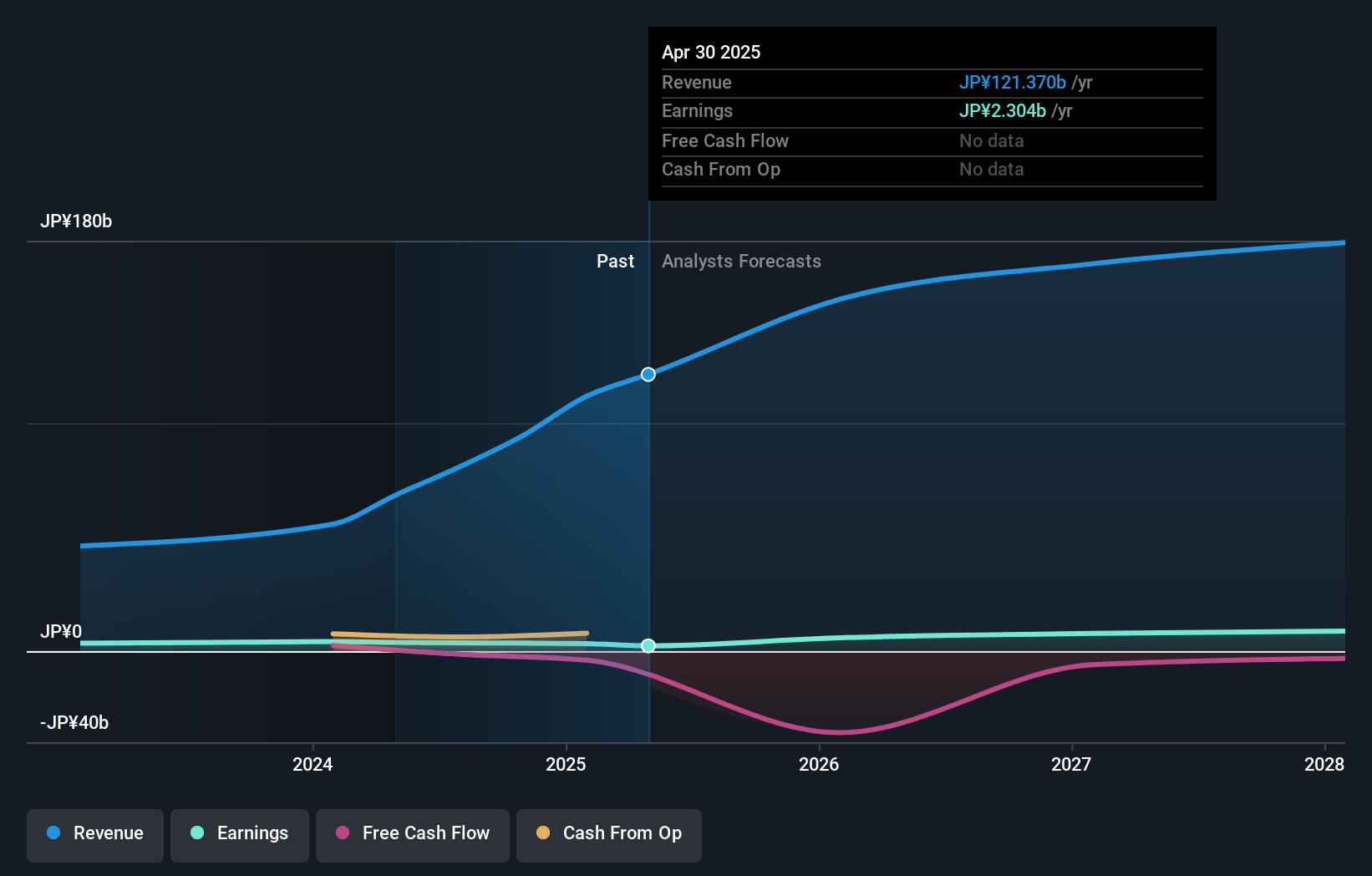- Japan
- /
- Hospitality
- /
- TSE:9166
Private equity firms invested in GENDA Inc. (TSE:9166) copped the brunt of last week's JP¥18b market cap decline
Key Insights
- GENDA's significant private equity firms ownership suggests that the key decisions are influenced by shareholders from the larger public
- 59% of the business is held by the top 3 shareholders
- Insider ownership in GENDA is 20%
A look at the shareholders of GENDA Inc. (TSE:9166) can tell us which group is most powerful. The group holding the most number of shares in the company, around 33% to be precise, is private equity firms. Put another way, the group faces the maximum upside potential (or downside risk).
And following last week's 13% decline in share price, private equity firms suffered the most losses.
Let's delve deeper into each type of owner of GENDA, beginning with the chart below.
See our latest analysis for GENDA

What Does The Institutional Ownership Tell Us About GENDA?
Institutions typically measure themselves against a benchmark when reporting to their own investors, so they often become more enthusiastic about a stock once it's included in a major index. We would expect most companies to have some institutions on the register, especially if they are growing.
We can see that GENDA does have institutional investors; and they hold a good portion of the company's stock. This suggests some credibility amongst professional investors. But we can't rely on that fact alone since institutions make bad investments sometimes, just like everyone does. If multiple institutions change their view on a stock at the same time, you could see the share price drop fast. It's therefore worth looking at GENDA's earnings history below. Of course, the future is what really matters.

We note that hedge funds don't have a meaningful investment in GENDA. Looking at our data, we can see that the largest shareholder is Midas Capital Co., Ltd. with 33% of shares outstanding. Nao Kataoka is the second largest shareholder owning 16% of common stock, and Capital Research and Management Company holds about 10% of the company stock. Nao Kataoka, who is the second-largest shareholder, also happens to hold the title of Chief Executive Officer.
After doing some more digging, we found that the top 3 shareholders collectively control more than half of the company's shares, implying that they have considerable power to influence the company's decisions.
While it makes sense to study institutional ownership data for a company, it also makes sense to study analyst sentiments to know which way the wind is blowing. Quite a few analysts cover the stock, so you could look into forecast growth quite easily.
Insider Ownership Of GENDA
The definition of an insider can differ slightly between different countries, but members of the board of directors always count. Company management run the business, but the CEO will answer to the board, even if he or she is a member of it.
I generally consider insider ownership to be a good thing. However, on some occasions it makes it more difficult for other shareholders to hold the board accountable for decisions.
Our most recent data indicates that insiders own a reasonable proportion of GENDA Inc.. Insiders own JP¥24b worth of shares in the JP¥120b company. This may suggest that the founders still own a lot of shares. You can click here to see if they have been buying or selling.
General Public Ownership
The general public-- including retail investors -- own 24% stake in the company, and hence can't easily be ignored. This size of ownership, while considerable, may not be enough to change company policy if the decision is not in sync with other large shareholders.
Private Equity Ownership
With a stake of 33%, private equity firms could influence the GENDA board. Sometimes we see private equity stick around for the long term, but generally speaking they have a shorter investment horizon and -- as the name suggests -- don't invest in public companies much. After some time they may look to sell and redeploy capital elsewhere.
Next Steps:
I find it very interesting to look at who exactly owns a company. But to truly gain insight, we need to consider other information, too. For instance, we've identified 3 warning signs for GENDA (1 shouldn't be ignored) that you should be aware of.
Ultimately the future is most important. You can access this free report on analyst forecasts for the company.
NB: Figures in this article are calculated using data from the last twelve months, which refer to the 12-month period ending on the last date of the month the financial statement is dated. This may not be consistent with full year annual report figures.
New: Manage All Your Stock Portfolios in One Place
We've created the ultimate portfolio companion for stock investors, and it's free.
• Connect an unlimited number of Portfolios and see your total in one currency
• Be alerted to new Warning Signs or Risks via email or mobile
• Track the Fair Value of your stocks
Have feedback on this article? Concerned about the content? Get in touch with us directly. Alternatively, email editorial-team (at) simplywallst.com.
This article by Simply Wall St is general in nature. We provide commentary based on historical data and analyst forecasts only using an unbiased methodology and our articles are not intended to be financial advice. It does not constitute a recommendation to buy or sell any stock, and does not take account of your objectives, or your financial situation. We aim to bring you long-term focused analysis driven by fundamental data. Note that our analysis may not factor in the latest price-sensitive company announcements or qualitative material. Simply Wall St has no position in any stocks mentioned.
About TSE:9166
GENDA
Through its subsidiaries, operates It operates amusement arcades, such as GiGO and the karaoke chain BanBan in North America, mainland China, Hong Kong, Taiwan, the United Kingdom, Vietnam, the Netherlands, Canada, and Singapore.
Reasonable growth potential with slight risk.
Market Insights
Community Narratives



